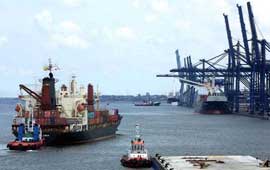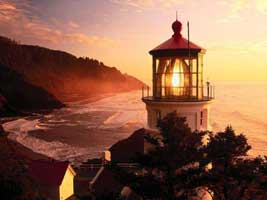| |
Issue 10 : February 2012 |
It is always surprising and at times disconcerting the feedback you get from newsletters. At times even the IT systems we use seem to be critics. Our last newsletter managed to elicit a profanity alert from one of the ports in Australia! Not sure they were complaining about our comments on the environment or some other bullshit; that ‘bullshit’ phrase the one which incidentally got us into trouble (and now may well do again!). Makes you wonder how politicians could ever get their message across on the web!
This letter is the product of its own delay as we worked in Europe for a spell in December and January. It is interesting how perspectives differ depending on where you are and the media you read; crisis, what crisis? The cruise sector is attracting a fair bit of attention so we have taken |
 |
the chance of pondering a little on their impact in the bottom line of ports. The new year also sees a renewed interest in education and training within DWA so we round off with a few comments on what we have learnt and how we intend to move forward. Hope you enjoy it all and, as always, it will be interesting to get your feedback on our opinions and comments in this newsletter, just contact me on [email protected]
|
Ports and the World Financial Crisis; Sorry the Euro Crisis
 |
|
What impact will the Euro Crisis have on the world, Asia and, from my perspective, ports in particular in 2012 and for the years following?
Four weeks working in Europe and then relaxing there over Christmas made me aware of the sharp difference in outlook between Europe and Asia. Strangely, this time even provided some anecdotal evidence to me that contradicted the doom and gloom at least from a non-euro zone but still European country. |
The media and the European media in particular, offer the impression that the world economy is teetering on the edge of a new dark age. This contrasted sharply to Government statistics, media reports and my coffee shop experience in Singapore, Jakarta and Malaysia in the month prior to my departure to Europe. There the statistics and reports on the local economies left you feeling and I can find no better way to say it, smug; smug because the crisis feels like a problem for someone else. This smug feeling gained strength in the activity of the coffee shops (and bars) I frequent.
Crisis, what crisis? That feeling was buoyed further by time outside London but in the UK. The high street of the town where I spent most time was quite clearly, and decisively, undergoing revival. It was certainly not providing symptomatic proof for the death-throws of a spent economic force.
Perhaps, the euro zone is suffering from a rather different form of crisis. A political crisis, a dream not supported by their economic policies over the last ten years. Now the expectation is for economics and financial policies to resolve a political and cultural problem. These are the roots of the real crisis. One that is very European. One that if the Europeans and the IMF were not obsessed with believing was a crisis for the world would be descending into a parochial political crisis. The US is showing signs of an economy under repair. China has an economy slowing, as needed, to deal with domestic overheating. Indonesia would appear to be surging to new heights of annual growth; and resolving many of the fundamental constraints on further growth. South America and Southern Africa appear to have more potential than for decades. The IMF has managed to report that world economic growth will be only 3% this year (a number that used to be considered an excellent, on trend, world growth figure).
So what is the impact of the doom and gloom in the media on port development? Perhaps, not much at all; after all, most port development demand is in Asia and South America with Africa coming up. Indeed, if project enquiries and awards received is the right measure, the only way is up this year. Problems are being solved, opportunities are being created and optimism, not pessimism, should be our view. European port projects and those of the developed world in general now have to compete for the same capital as projects in the developing world; the problem being that the returns look rather less attractive in the developed world. So, my conclusion, throw out the colonial media who are being self centred. Replace it with a world media that is focussed on a broader view and see the real growth centres and the full economy of the world.
Providing Development and Competition in Tanjung Priok
One of the key problems in Indonesia has been infrastructure or more precisely, the lack of infrastructure. Pelindo II the state-owned port company for West Java and South Sumatra, for example, has not made a major investment in expansion since about 1996; a failure that the Ministry of Transport needed to address.
| So, the recent cancellation by the Ministry of Transport in Indonesia of the tender for the Kalibaru Port Development sounded like bad news for Indonesia; cancellation of the key port development for the country. The attendees at the meeting for pre-qualified companies (and the press) say the reason was that the Government could not fund the investment required for the dredging and the approach bridge required. |
|
 |
But, never mind, the Kalibaru Port project lives! It lives on in the shape of Pelindo II’s far more ambitious plans. We are privileged to be involved in their development and look forward to progressing what is perhaps the world’s largest port development over the next three years. 5 million TEU of container capacity and a million cbm of tank storage! Hopefully Pelindo II is the leopard that has changed its spots!
Those of us observing the process closely could look positively of the Ministry of Transport, perhaps, in the back of their minds they were more concerned about the risk that their development was just not large enough to cope with the 20%+ growth rate for containers last year, were worried that the program expectation of their development being ready in 2017 offered too little too late and the prequalification process probably led them to realise their tender may well not have delivered the key goal of Shipping Law No. 17; competition. All these are now being offered to the Ministry by Pelindo II. It takes strong people to change their minds. The Ministry now need to support Pelindo II; because this development is vital for Indonesia.
Navigation Aid for Cruise Ships in Europe
 |
|
Another collection of reasons to spend Spring Break in Miami has emerged! Once more I shall be attending Cruise Shipping Miami and drinking in one of the best trade shows and conferences around. Given my interest is in Cruise Terminals and they, almost by their nature, are problematic in terms of commercial port investments, it may seem odd that we seem to have such a successful practice in the cruise sector. My first involvement in the sector more than twenty years ago characterised perhaps the benefits and problems of the cruise sector for a commercial port. |
As a management team within the port we suddenly found it relatively easy to attract a few cruise ships to call and assist them with turnarounds and a range of other services. We also found that the money was good and we had almost no investment to make to provide the service required. From my very poor memory the port handled 5 then 10 and then 15 ships in a sequence of three years, each year dropping significant profit to the bottom line with almost no impact on costs. Then we started to take it seriously as a business. Work was done to understand what we needed to do to go to the next level. The creation and operation of effectively, a home port Cruise Terminal. Then, as soon as the cost of the berth and the building needed to be charged against the income, it became clear making money from Cruise Terminals is very difficult. There is strong evidence to suggest that whilst cruise calls can provide important marginal revenue to ports, for them to justify substantial investment is far more difficult. Unless you are a cruise line or the terminal is a feature of a broader commercial property development or subsidised to deliver other economic benefits, justifying the investment requires cruise lines to pay rather more per passenger for the service provided than surveys suggest they actually do. Looking at the European Union’s port directive and related approaches to the subject of subsidy may, over the next few years, have a more profound impact on the cruise sector than has so far been realised. Watch this space, cruising in Europe may have more rocks to worry about than those of Giglio!
Education and Training a Core Investment As a company we are growing up and, as I hope we all know, learning, is an important part of growing up. Through projects in Indonesia, Vietnam and India we have developed a clear
approach to the delivery of sustainable capacity development in the ports and maritime sector (fancy development words for education and training).
This “DWA” approach is based on the premise that it is not possible to implement standard “international best practice” solutions into cultures and organizations for which they were not designed and are not appropriate. Instead it is necessary to adapt “international best practice” to the specific situation through a process that: |
|
 |
 |
Builds an understanding of the reality of the situation on the ground |
 |
Examines the fundamental logic and mechanics of “best practice” |
 |
Adapts “best practice” to enable the organisation to move forward toward their strategic goals |
Engaging with clients to the depth required to make this work has helped us to understand rather more about the general level of education in some countries than we really wanted to know. The practical implication of the standard of education for the port sector is that workers often do not understand simple concepts, for example, basic statistics such as the average. One survival tactic for the individuals and organizations be they ministries, state owned companies or private companies is a culture that focuses on box ticking rather than problem solving. Repeating the previously accepted work as closely as practical represents success; diverging from historical precedent involves risk. The implication of this is that change and the ability to progress new ideas of any description are limited. The inertia and resistance to change of some of the organisations we have worked with is demonstrated, at times, by their ability to learn and change for a short period when they have intense support, but fail to develop the strategies into longer term development and then heal over the change as that support is withdrawn.
As a company we are now investing heavily in research that seeks to tackle some of the problems we have identified. It is being done with both a long term view, “the port sector has to take education seriously” and to ensure we have a short to medium term plan for methods to encourage and implement the required change within the sector.
Watch our newsletters and announcements over the next few years for new and practical approaches to education, training and change management that will seek to address the problems we have observed. Carolyn will be leading these efforts and hopefully in the next issue there will be her first report on methods, approaches and initiatives that we are looking towards offering so that better services in education, training and change management become sustainable.
Bidding for Aid Work, Aid Bureaucracy and the Effectiveness of Aid
 |
|
Bidding for ADB contracts is a time consuming exercise. In recent weeks ADB demonstrated a level of commitment to broad but capable shortlists for a significant maritime job they are funding. We were privileged to be invited and assembled a highly capable team for the submission. The submission method was electronic; a form of torture that presumably is rather easier if you do it several times a week and understand what is expected. |
The slight grumble about electronic submission aside I was more interested in the side discussions I had about working with ADB. DWA has to be realistic; we are small and putting it positively, not overburden with administrative capability. In other words, we don’t do bureaucracy. As a way of supplementing our organisational skill (and experience of dealing with ADB’s bureaucracy) I sought cooperation from not one but two much larger consultants whom I respect. It was surprising that both came back with the answer, paraphrasing, we do not deal with ADB because their systems and bureaucracy are so bad we spend all our time on that, rather than what they are meant to be paying us to do...
The words and the tone from the two consultants were different but the meaning very clear. That such responses were received from such competent sources adds to the disappointment I have experienced when dealing with a range of aid or multilateral donors and “banks” over the last twenty years. Other ventures have seen them responsible for the pursuit of individuals’ own political agendas within aid programs, changing strategy almost mid-sentence and a focus on ensuring the survival of their projects above and beyond their actual utility to those they are meant to be supporting.
That change and support to the poorest in our world is required is beyond doubt. However, given the contrast between social programs run by committed individuals with no money which generally perform well and “big” aid which rarely does, perhaps aid and what we think about aid needs rethinking rather than seeking to spend more which seems the goal of so many pressure groups (and at times Governments).
|